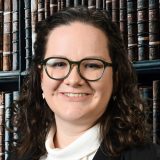Oklahoma Bar Journal
Pro Se Waiver Divorce Clinic
By Ana Reynolds

adobe.stock.com | LIGHTFIELD STUDIOS | #235169475
Legal clinics can come in many forms, but there are generally three common goals when creating a clinic: assisting to prevent errors, advising so individuals can navigate court on their own and fixing problems that halt the legal process.
PRO SE WAIVER DIVORCE CLINIC
The Pro Se Waiver Divorce Clinic was created out of a need seen by Legal Aid Services of Oklahoma Inc. (LASO), district court judges of Oklahoma County, OCU School of Law and members of the private bar. This is a LASO clinic; therefore, there are restrictions on the provision of legal assistance. Due to funding and other ethical obligations, there are limits that restrict us from assisting everyone who comes in. Applicants must meet LASO’s qualifications, which include income, asset and conflict qualifiers. If they don’t meet the requirements, they may be assisted by a private bar attorney if one is available on that day. It is at the discretion of the private bar attorney to set the scope of their services.
Cindy Goble, a clinic co-founder and current director of pro bono services for LASO, described the creation of the clinic:
The idea to start the Pro Se Waiver Docket [clinic] began early in 2010. Gail Stricklin, private practice attorney, Laurie Jones, professor at OCU School of Law, and myself, Pro Bono Coordinator for Legal Aid (at the time) met with the Family judges who identified the Pro Se Waiver Docket as an area of great need. Planning began with drafting of forms and recruiting law students and volunteer attorneys. Travis Pickens, who was at that time the OBA Ethics Counsel, helped with review of the forms and procedures and in March 2010, the clinic was started. (This was unintentional because we only planned to watch how things worked prior to starting the clinic, but when the judge saw us there, we were handed our first case.)
HOW DOES IT WORK?
The waiver docket is every Monday, Wednesday and Thursday at 1:30 p.m.; the clinic is held every Wednesday afternoon. The party must have their file pulled by the court clerk’s office before 12:30 p.m. to be heard on that day’s docket. The waiver docket rotates monthly in accordance with the chief domestic judge. Before an applicant can be considered for clinic assistance, the parties go before the judge. The judge reviews their paperwork for issues that bar them from granting the divorce, either in the paperwork or from the testimony. If there is an issue, the judge will fill out a “blue sheet.” This sheet is, well, blue, and it has a list of common issues. The judge indicates the applicable issues/defects. This can be done on any day of the waiver dockets. The judge gives the parties the blue sheet and either instructs them on when to return for the clinic or, if it is a Wednesday, sends them directly up to the law library. If the Oklahoma Department of Human Services is necessary or the agency needs to approve paperwork, an attorney from Child Support Services is present only on the first and third Wednesdays of the month to review and assist as necessary.
The clinic has fillable templates for volunteers to use. Although, many of the edits can be completed directly on the applicant’s documents. If the attorney completes the judge's list, there are no other requirements (i.e., a waiting period), and if the judge allows it, the applicant will be sent back to the judge to hopefully get divorced.
THE CLIENTS
The number of individuals who come to the clinic varies every year. In 2020, through the pandemic with restrictions and closures for over six months, the clinic still helped 92 individuals. In the last two years, an average of 130 individuals were assisted each year. Around 30% of individuals we’ve helped received a finalized divorce the same day they visited the clinic. The clinic was able to help finalize divorces for approximately 90% of the people referred.
In 2020, approximately 75% of the individuals referred qualified for services. That means they were either low-income individuals, seniors or were experiencing or had experienced domestic violence. In 2020, 30% of the individuals we assisted qualified for our services because they experienced domestic violence. For many of the individuals, the abuser was the former spouse. Having this clinic allowed these individuals an opportunity to legally separate. When an individual who experiences domestic violence comes to the clinic, they are given more information about some of the other community resources available to them.
CAN IT BE REPLICATED?
This clinic is a joint operation between many different organizations, but it would not be possible without the willingness of the judges to host the pro se waiver docket. The judges put time aside for the docket, specifically for people who are pro se. There was an infrastructure put in place to assist pro se clients and a willingness to allow LASO to come in and assist. Ultimately, the willingness and need of the court got LASO in the door and has kept us involved. LASO’s Oklahoma City office is limited in the number of staff we can supply due to funding; however, we understand the need in the community, which is why we continue to assist. It is also why the private bar is so important – because we can’t do it all.
Other LASO offices currently have or have had their own version of this clinic. Norman had a clinic, but funding was lost, and the clinic was discontinued. Stillwater currently has one, but they are not in person every week. They are called in by the judge if people need assistance.
WHY YOU SHOULD HELP
This clinic cannot run without volunteers. The Pro Se Waiver Divorce Clinic needs volunteers, and we would love for you to help!
If you are a private bar attorney who wants to volunteer but are limited on time, the clinic is only once a week, a maximum of four hours, and you pick the weeks you attend. This can help you get pro bono hours, but it is also an opportunity to get out of the office and help people solve their problems, usually on the same day. If you are a solo attorney, it is also an opportunity to build relationships with other attorneys and the judges and discuss common issues.
For law student volunteers, this clinic is a crash course in family law. Students are exposed to magic words like “best interest of the child,” and they can see the divorce process from start to finish. This is helpful for all students, not just those who want to practice in this area, as family law is currently tested on the bar exam. Also, students get face-to-face interaction with attorneys, clients and judges. Ms. Goble explained, “The clinic is a great experience for law students who are allowed to sit in front of the bar during the docket call.”
For anyone who was in school starting in 2020 or later, many face-to-face opportunities were, and continue to be, limited. As an individual who just graduated and passed the July 2022 bar exam, my experience at the clinic after graduation was invaluable in sharpening my strengths for job searches and now in my day-to-day work. For example, many people who come to the clinic had to take off work and find childcare only to be told they didn’t do something right. The attorneys who work at the clinic week to week are professional and caring in the way they deal with the frustration. It’s a great learning experience to see how to handle client interactions and what to do when you have an upset client.
COMMUNITY COOPERATION
The clinic started as an attempt to fix a problem, but the reality is it wouldn’t exist without the cooperation of the judges, the private bar and the OCU School of Law. LASO has attorneys with a passion for helping as many people as they can, but without cooperation and volunteers, the clinic is unable to reach its full potential. The work that Gail Stricklin, Laurie Jones and Cindy Goble did through their organizations and spheres of influence in creating the clinic is something the legal community should strive for: problem-solving together. In reflection on the project, Ms. Jones wrote:
[The clinic] was such a collaborative effort and each “player” in the process had equal input. We listened to each other, and supported each other, which resulted in excellent representation for the clients and a level of satisfaction for all that was unlike anything I have experienced in my professional career.
We hope the clinic continues to grow and expand in its capacity and influence. To all the individuals who have lent a hand as volunteers, students or even judges, we thank you for helping this clinic function for more than a decade.
For more information about the Pro Se Waiver Divorce Clinic, please contact Ana Reynolds at ana.reynolds@laok.org or Cindy Goble at cindy.goble@laok.org. To volunteer with Legal Aid Services of Oklahoma, visit www.probono.net/ok/signup.
 ABOUT THE AUTHOR
ABOUT THE AUTHOR
Ana Reynolds is the pro bono coordinator for the Oklahoma City office of Legal Aid Services of Oklahoma, where she works to expand the pro bono program. Originally from New Mexico, Ms. Reynolds relocated to Oklahoma and received her J.D. from the OCU School of Law in 2022.
Originally published in the Oklahoma Bar Journal – OBJ 95 Vol 8 (October 2023)
Statements or opinions expressed in the Oklahoma Bar Journal are those of the authors and do not necessarily reflect those of the Oklahoma Bar Association, its officers, Board of Governors, Board of Editors or staff.
